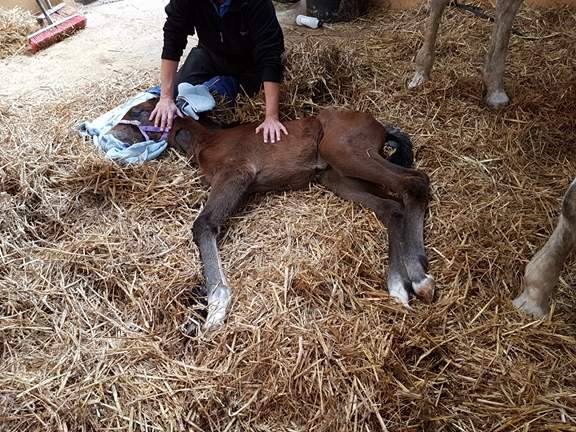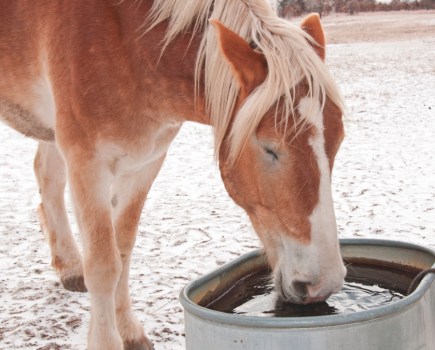Beth Ault at XL vets reveals all about her quiet Easter weekend and helping a newborn foal to find her way in the world…
I’ve just enjoyed a surprisingly quiet Easter weekend on call, to the extent that I rang the paging company twice to make sure the phones were working! As usual I had calls from a couple of forgetful clients on Saturday morning who had run out of crucial medication over the long weekend, luckily I was already at the clinic so was able to quickly put up some medication for them whilst I was there.
Other than that the only client I saw was at a small stud farm near the practice, unfortunately, for them though, I did see them twice! This is becoming a theme for them at the moment as they are in their first year of breeding and it seems their mares and foals are determined to demonstrate to them the A to Z of common foal ailments in one year.
Two weeks ago, having had a very busy evening on call with an inpatient with a temperature, a colic and a horse with a very nasty pelvic fracture, I finally collapsed into bed at 2.30am. When the phone rang at 4am to say they had a maiden mare who wouldn’t let her new born foal suckle I was starting to question the sanity of my current career path! I dragged myself out of bed and arrived to a beautiful filly foal who we spend the next couple of hours encouraging to suckle. Unfortunately a combination of the mare’s resentment and the foal’s stupidity meant we weren’t confident that she’d had as much colostrum (the early especially nutritious mare’s milk) as we’d have liked. Having asked the nurse on call to join us for an extra pair of hands we managed to milk the mare and give the foal colostrum via a tube into her stomach. By this time it was 8am so I rushed home for a much needed shower and then started my day of routine calls.
An update at lunchtime and the foal was suckling well and I breathed a sigh of relief. But there was more to come…

Now well, the foal is happy and full of beans!
By mid afternoon she had stopped suckling again so I headed back to the yard to check her over. She was bright and well but was swishing her tail excessively. In foals this is called tail flagging and is often associated with a build up of meconium (the initial faeces that foals pass) in the foal’s rectum. Having questioned the owner further it transpired that she hadn’t passed as much meconium as she should have done by this point. A rectal examination confirmed a meconium impaction and so we treated her with an enema to help her pass it. At this point I was glad that the product we use was already in the foal box as it’s a human product and trying to buy it from the chemist can get a little awkward!!! Thankfully, she quickly passed a large volume of meconium and has been suckling well ever since.
One of my colleagues was back out to see them about a week later to take a blood sample from a gorgeous little colt foal. We routinely take a blood sample at approximately 24 hours of age to check if they’ve received adequate colostrum. Foals are born without an immune system and it takes several months to develop. All of their protection against infection comes from proteins called antibodies which are acquired from their mother primarily through the colostrum. They are only able to absorb these antibodies through their gut walls for the first 24 hours of life. After this the blood sample is taken to measure the number of antibodies in their blood.
On Saturday lunchtime I had a phone call from one of the senior vets at the practice who run the blood tests for us. She rang to let me know that the colt foal’s antibody levels were alarmingly low. Once again I was heading back to the stud to treat another common foal complaint. Luckily the foal was still bright and well and so far unaffected by his poor immune system. However, whilst I was there we did notice another problem, the mare had a reddish brown discharge from her vulva! Further examination revealed that the mare still had a ‘dirty’ uterus post foaling. I flushed her out with a large volume of fresh water and started her on antibiotics.

A happy mum with her healthy foal!
Once the mare was sorted we were able to get started on treating the foal. Low antibody levels are treated with a plasma transfusion, we store the plasma frozen and carefully defrost it when required. We then place a catheter in the foal’s vein and slowly administer the plasma, monitoring the foal carefully for a reaction. Happily, the procedure went smoothly and when I went back the next day to flush the mare again and repeat the foal’s blood sample he was the picture of health, bucking and bouncing around the stable! Fingers crossed for a better blood result this time!








